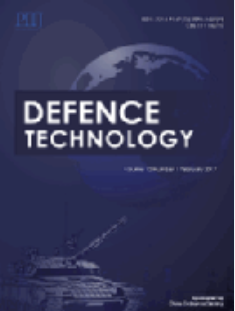Anti-migration of NG by using EPDM insulation materials coated with reduced graphene oxide
IF 5
Q1 ENGINEERING, MULTIDISCIPLINARY
引用次数: 0
Abstract
The migration of nitroglycerin (NG) has always been the critical issue that harmfully impacts the structural integrity and operational reliability of the solid rocket motor, which is mainly composed by Nitrate Ester Plasticized Polyether (NEPE) propellant/Hydroxyl-terminated Polybutadiene (HTPB) liner/Ethylene Propylene Diene Monomer (EPDM) insulation bonding system. This paper proposes an innovative surface modification method attempting to modify the EPDM insulation layer coated with reduced graphene oxide (RGO), which exhibits ability to weaken the NG absorption by EPDM insulation layer, blocking the pathway of NG migration into EPDM insulation materials. The microstructure of RGO-coated layer was analyzed and the formation mechanism was investigated. The RGO-coated layer is well bonded to the HTPB liner, and its anti-migration performance to NG at different temperatures has been evaluated. Comparing with blank samples under the same storage conditions, the RGO-coated layers can reduce the diffusion coefficient of NG by up to 87.3% and increase the diffusion activation energy of NG by 14.8 kJ⋅mol−1. This research provides a new strategy to effectively inhibit NG migration in NEPE propellant/HTPB liner/EPDM insulation bonding system.
用还原氧化石墨烯包覆三元乙丙橡胶绝缘材料的抗NG迁移性能
摘要以硝酸酯塑化聚醚(NEPE)推进剂/端羟基聚丁二烯(HTPB)衬垫/三元乙丙烯(EPDM)绝热键合体系为主要组成的固体火箭发动机,其迁移问题一直是影响发动机结构完整性和运行可靠性的关键问题。本文提出了一种创新的表面改性方法,试图对EPDM保温层涂覆还原氧化石墨烯(RGO)进行改性,该方法能够减弱EPDM保温层对NG的吸收,阻断NG向EPDM保温层迁移的途径。分析了rgo包覆层的微观结构,并对其形成机理进行了探讨。rgo包覆层与HTPB衬套结合良好,并对其在不同温度下对NG的抗迁移性能进行了评价。与空白样品相比,在相同的储存条件下,rgo包覆层可使NG的扩散系数降低87.3%,使NG的扩散活化能提高14.8 kJ⋅mol−1。本研究为NEPE推进剂/HTPB衬垫/EPDM绝热粘接体系中有效抑制NG迁移提供了一种新策略。
本文章由计算机程序翻译,如有差异,请以英文原文为准。
求助全文
约1分钟内获得全文
求助全文
来源期刊

Defence Technology(防务技术)
Mechanical Engineering, Control and Systems Engineering, Industrial and Manufacturing Engineering
CiteScore
8.70
自引率
0.00%
发文量
728
审稿时长
25 days
期刊介绍:
Defence Technology, a peer reviewed journal, is published monthly and aims to become the best international academic exchange platform for the research related to defence technology. It publishes original research papers having direct bearing on defence, with a balanced coverage on analytical, experimental, numerical simulation and applied investigations. It covers various disciplines of science, technology and engineering.
 求助内容:
求助内容: 应助结果提醒方式:
应助结果提醒方式:


